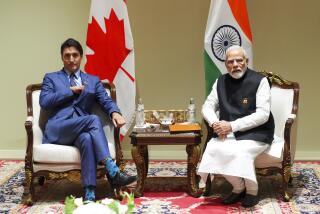India and Pakistan Sound Conciliatory
- Share via
WASHINGTON — U.S. officials said Wednesday they were beginning to see signs that tensions are easing between India and Pakistan after a three-week standoff that included a buildup of military forces on their border.
As President Bush continued diplomatic efforts, White House and State Department officials cited conciliatory statements by Indian and Pakistani officials. They said Pakistan’s government has continued to take steps against terrorist groups based in the country, as India has urged it to do.
“There are certainly indications that India and Pakistan have moved beyond where we were a week ago, or even before the weekend,” said one U.S. official, who spoke on condition of anonymity.
Officials said that the confrontation between the two nuclear powers remained dangerous and that the nations needed to continue their efforts.
India and Pakistan, which have fought three wars since independence from Britain in 1947, have been at the brink of another one since a terrorist assault on India’s Parliament on Dec. 13. India has blamed the attack, which killed 14 people, on Kashmiri separatists based in Pakistan.
Cross-border transportation between the countries has been curtailed, diplomatic contacts have been scaled back and both governments have rushed troops toward the 1,800-mile-long border.
But in the last few days, the leaders of the nations have been making more positive statements and gestures.
Pakistan has arrested militants, seized assets of some groups and taken steps to close down their operations.
In Katmandu, Nepal, Indian Foreign Minister Jaswant Singh and his counterpart from Pakistan, Abdus Sattar, smiled and shook hands during a preparatory meeting for a regional summit that begins Friday.
State Department spokesman Richard Boucher noted that Indian Defense Minister George Fernandes said Indian troops on the border were not in battle position.
“We are pleased to see that Pakistan and India continue to take steps to defuse the tensions between them,” he said. “We do think that each of these countries is acting responsibly in order to avoid a conflict.”
Bush, who last weekend stepped up U.S. efforts to promote peace, talked about the situation Wednesday with British Prime Minister Tony Blair, who is traveling to the region for talks.
A U.S. official noted that the government of Pakistani President Pervez Musharraf has also banned inflammatory posters, taken away collection boxes used to solicit money, and is trying to figure out how to reshape fundamentalist Islamic schools.
Even so, U.S. officials and private experts predicted it would be tough for Pakistan to root out all those in the government who have been sympathetic to the extremists.
Terence Taylor of the London-based International Institute for Strategic Studies, a private research group, said that although there have been hopeful signs in recent days, the situation remains dangerous because so many people in both countries have stakes in the conflict. He particularly cited Islamic fundamentalists in Pakistan who are eager to foment a crisis that could unseat the pro-Western Musharraf government.
“That, to me, is the great danger,” said Taylor, who works from an office in Washington.
A delegation of nine U.S. senators is heading today to South Asia and plans to take up the India-Pakistan dispute in addition to meeting with U.S. troops in the region.
Sen. Joseph I. Lieberman (D-Conn.) told a news conference that he and Sen. John McCain (R-Ariz.) are leading the delegation on an eight-day trip. They plan to visit countries including Pakistan, Uzbekistan, Tajikistan and Turkey. Lieberman said the senators will appeal for “moderation and the kind of restraint that will defuse a very difficult situation.”
*
Times staff writer Richard Simon contributed to this report.
More to Read
Sign up for Essential California
The most important California stories and recommendations in your inbox every morning.
You may occasionally receive promotional content from the Los Angeles Times.











